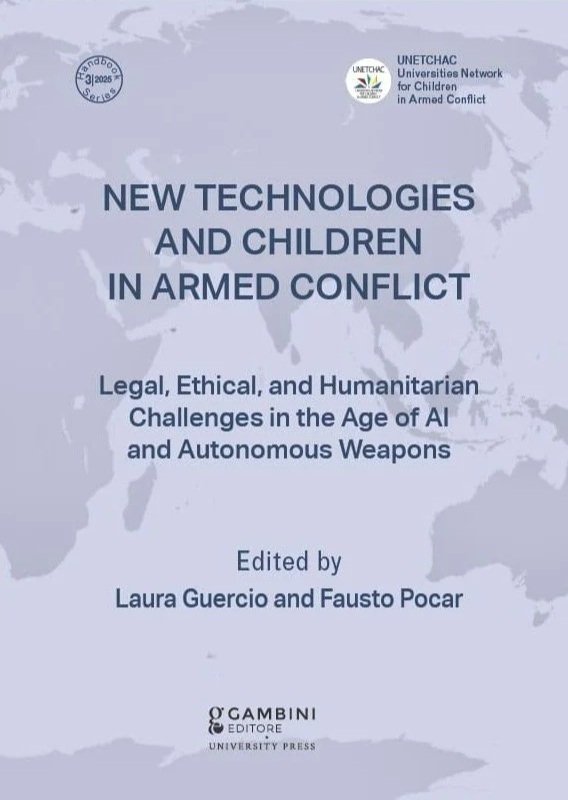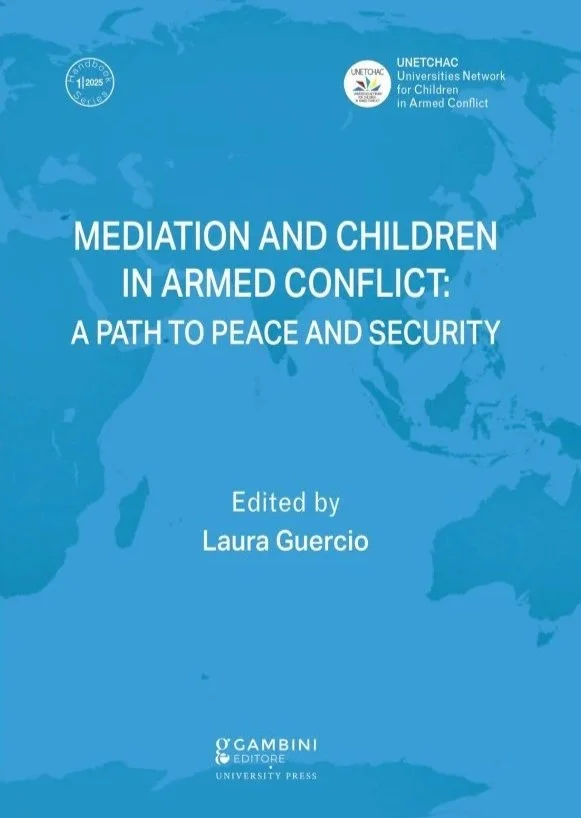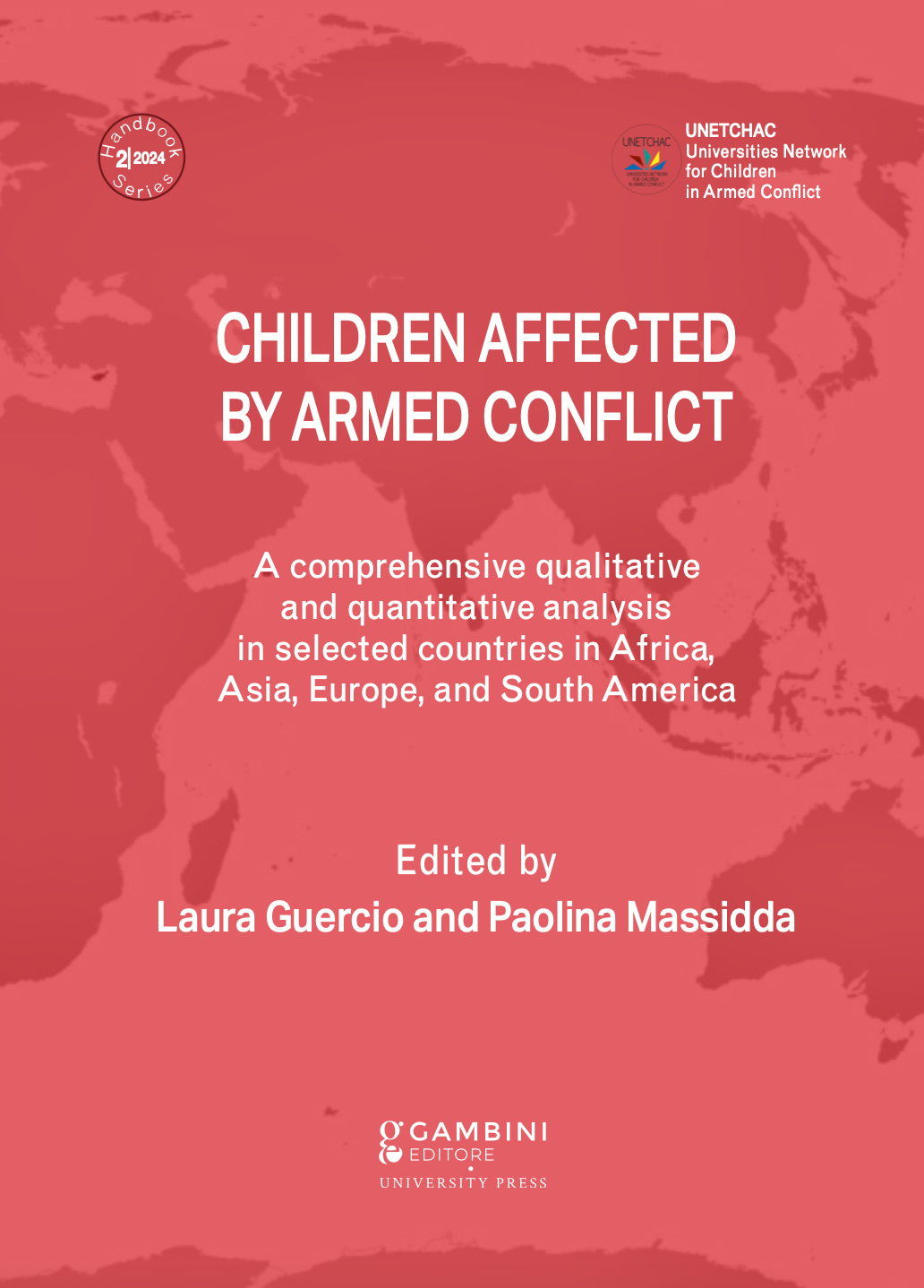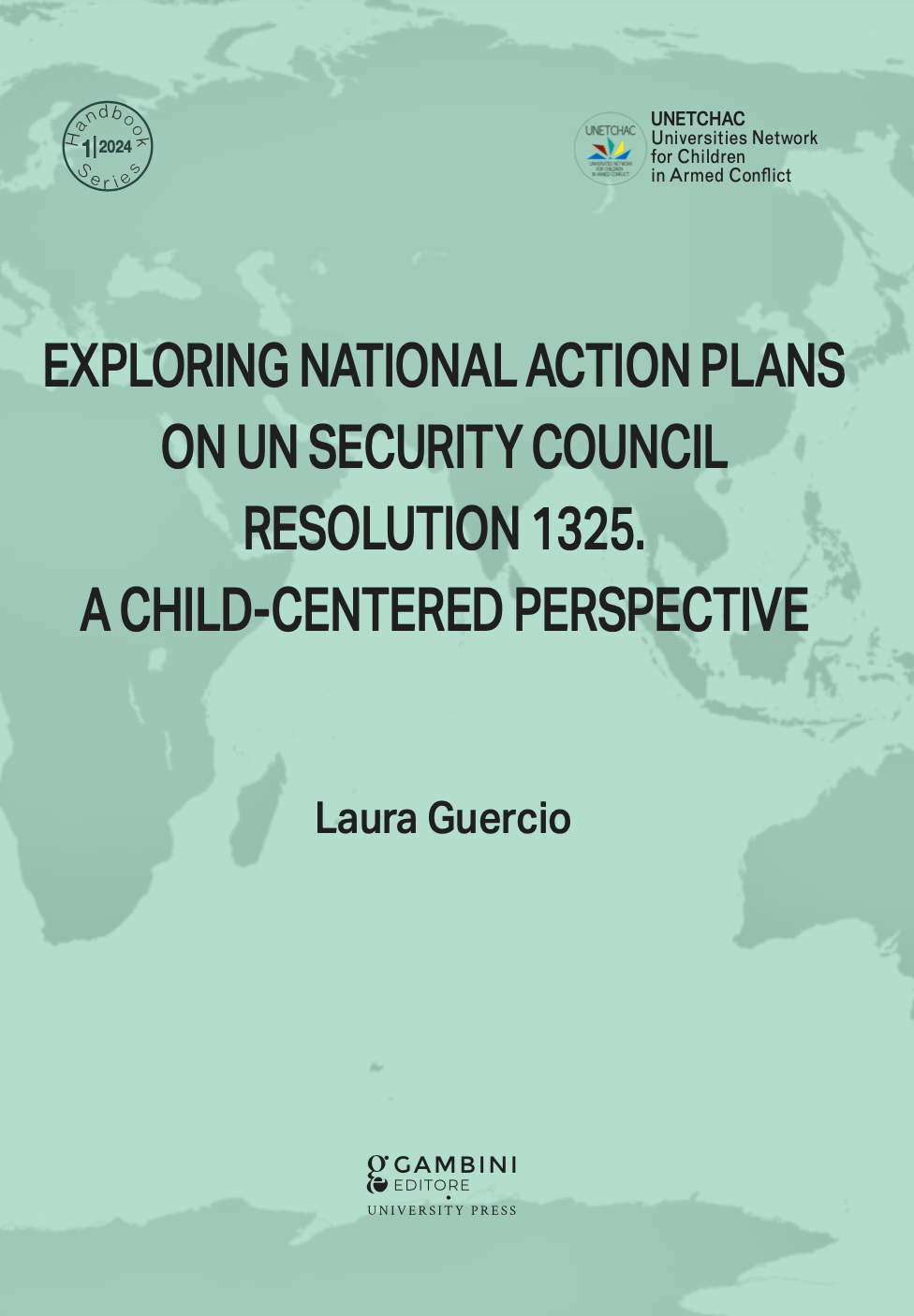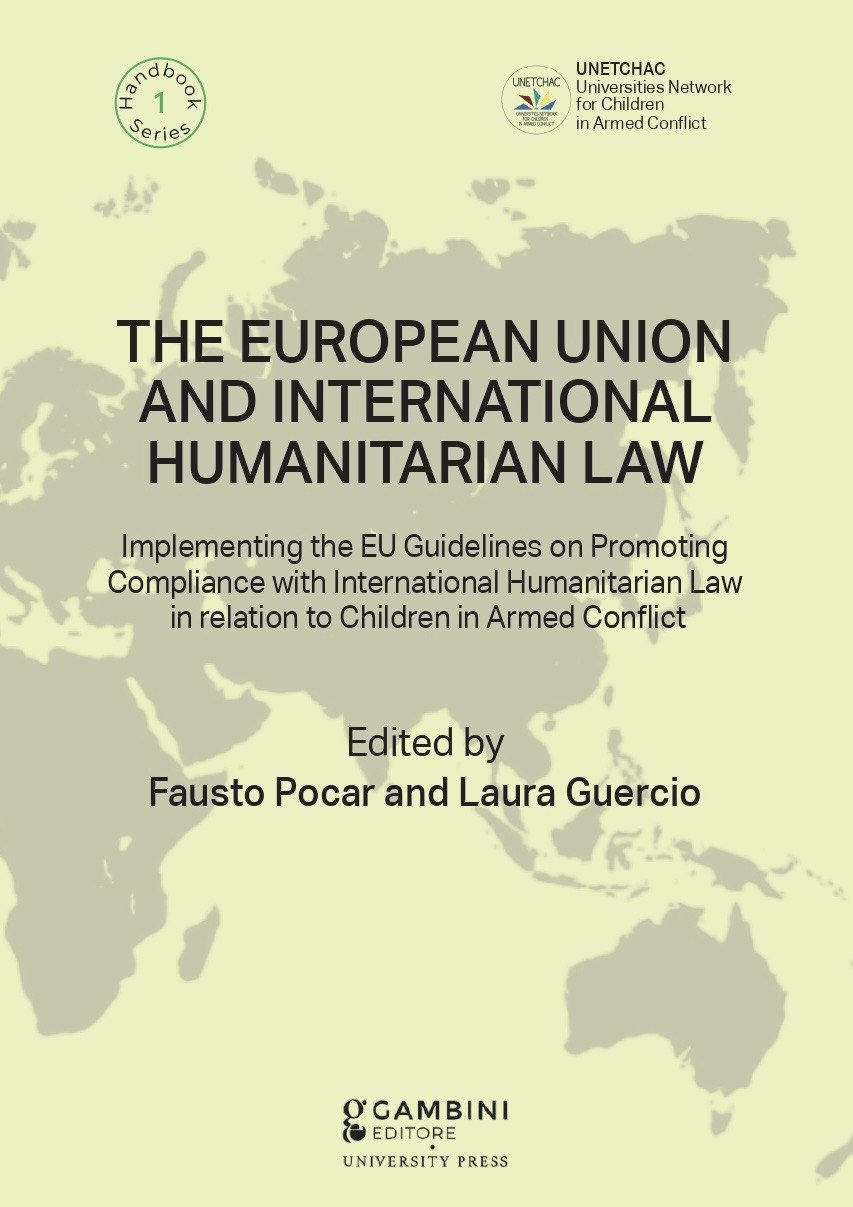PUBLICATIONS
“NEW TECHNOLOGIES AND CHILDREN IN ARMED CONFLICT”.
Legal, Ethical, and Humanitarian Challenges in the Age of AI and Autonomous Weapons.
This Handbook explores the intersection of emerging technologies – particularly artificial intelligence, autonomous weapons systems, and cyber warfare – and their impact on children in armed conflict. Through a multidisciplinary and multi-stakeholder approach, the book provides legal, ethical, and policy-oriented insights aimed at strengthening child protection frameworks in a rapidly evolving landscape
MEDIATION AND CHILDREN IN ARMED CONFLICT: A PATH TO PEACE AND SECURITY
Beyond resolving disputes, mediation can empower young people to actively participate in peace processes that shape their future. This book explores the role of mediation in safe-guarding children in conflict, emphasizing the importance of involving young people as mediators. By equipping them with conflict resolution skills, they gain a voice in peacebuilding while advocating for children’s rights. This book is part of a project by the Universities Network for Children in Armed Conflict and the Institute of Political Studies "S. Pio V" with support from the Italian Ministry of Foreign Affairs (MOFA), dedicated to establishing the Youth-Net Mediators for Peace and Security. This network equips young mediators with skills in conflict resolution, mediation techniques, and child protection strategies, empowering them to promote peace and defend children’s rights in conflict-affected areas. The book delves into mediation’s theoretical and practical aspects, ethical considerations, and the challenges of involving young people in peace efforts. It also presents real-world examples of YouthNet Mediators in action, demonstrating the transformative role of youth in conflict resolution and peace-building. This aligns with the belief that young people are not just the leaders of tomorrow but active agents of change today.
CHILDREN IN ARMED CONFLICT AND CULTURAL HERITAGE. Protecting Cultural Heritage as a Key Element in Preserving Children’s Rights in Armed Conflict
This volume explores the profound and often overlooked relationship between cultural heritage protection and the rights of children in times of war.
Armed conflicts not only devastate communities but also erase cultural heritage, severing children from the traditions, history, and identities that ground their sense of belonging. This handbook brings together leading experts to analyze how the destruction of cultural heritage impacts children’s lives, from disrupting education and displacing communities to undermining mental well-being and cultural continuity. Through case studies, legal frameworks, and interdisciplinary insights, this essential volume highlights the urgent need for strategies that integrate cultural heritage protection with children’s rights. It underscores the importance of preserving cultural landmarks, traditions, and knowledge as part of safeguarding children’s futures and fostering post-conflict recovery. An indispensable resource for policymakers, practitioners, and researchers, this handbook offers actionable pathways to ensure that protecting culture and children’s rights go hand in hand, even amidst the chaos of armed conflict.
CHILDREN AFFECTED BY ARMED CONFLICT. A comprehensive qualitative and quantitative analysis in selected countries in Africa, Asia, Europe, and South America
This comprehensive study navigates the harrowing landscape of children entangled in the tumult of armed conflicts across re- gions spanning Africa, Asia, Europe and South America. Using a meticulous methodology that integrates both qualitative and quantitative research, the study illustrates the intricate challen- ges faced by children while advocating for their recognition as pivotal actors of peace, security and justice. The dual approach to data analysis forms the backbone of the research, offering a nuanced understanding through a comparative lens of internatio- nal and local data. By delving into global statistics and juxtapo- sing them with locally sourced information, the study unveils not only overarching trends but also the unique contextual nuances that define the experiences of children in conflict zones. Integral to the study is the recognition of children as active agents of chan- ge in the pursuit of peace, security and justice. Aligned with the principles of the Convention on the Rights of the Child, the report advocates for empowering children through education, psycholo- gical well-being, and legal frameworks that amplify their voices. This transformative perspective underscores the urgency of bre- aking cycles of violence by investing in the resilience and agency of young individuals.The synthesis of quantitative and qualitative insights, coupled with the acknowledgment of children as active contributors to peace, positions this study as a compelling call for action for a world that safeguards the future of children.
EXPLORING NATIONAL ACTION PLANS ON UN SECURITY COUNCIL RESOLUTION 1325. A CHILD-CENTERED PERSPECTIVE
The book “Exploring National Action Plans on un Security Coun- cil Resolution 1325. A Child-Centered Perspective” explores the pivotal role women have historically played in establishing endur- ing peace and security. It delves into the significance of the land- mark United Nations Security Council Resolution (UNSCR) 1325, recognizing women as positive agents in peacebuilding and af- firming their right to participate in decision-making across all lev- els of conflict resolution. Highlighting the crucial role of National Action Plans (NAPs) in implementing UNSCR 1325 at the nation- al level, the book serves as a guide for localizing actions within the Women, Peace, and Security Agenda. Despite the increasing number of NAPs over time, the book observes that not all of them include children. The IV Italian Plan (2020-2024) is exceptional for explicitly incorporating children into its objectives, showcasing Italy’s commitment to promoting gender equality, empowerment, and the protection of children in conflict and post-conflict are- as. The book is the outcome of a comparative analysis research project supported by the Italian Ministry of Foreign Affairs, span- ning diverse regions such as Asia, Europe, South America, and Africa. With a specific focus on child inclusion within the frame- work of UNSCR NAPs, the research reveals that some analyzed countries have not adopted a NAP on UNSCR 1325. Furthermore, among those that have adopted it, a specific focus on children is often lacking. This underscores the pressing need for a global commitment to address the challenges faced by children affected by armed conflict.
CHILDREN IN ARMED CONFLICT: HOW CAN THEY BE PROTECTED IN A MULTILEVEL INTERNATIONAL FRAMEWORK?
A Joint Commitment by National and International Institutions and Organizations Together With the Academic Community (2023)
In order to strengthen actions and measures to protect children in conflict and post-conflict situations, it is increasingly necessary to rely on a joint multilevel international framework. This is essential to promote synergic commitment carried out by different actors who must act together to ensure the full and effective enjoyment of fundamental rights by these particularly vulnerable children exposed to extreme levels of violence and repeated violations. This requires continuous effort and cooperation between international and national institutions and organizations, non-governmental organizations, civil society, and the international academic community.
The Universities Network for Children in Armed Conflict (UNETCHAC) therefore promotes actions and activities aimed at strengthening these partnerships that always have the best interests of the child at their core. This book brings together some of the contributions from institutional representatives, professors, researchers and experts, collected as a follow-up to one of the conferences organized by the Network aimed at highlighting the need for constant common commitment in protecting the rights of children who are direct and indirect victims of conflicts and at raising awareness on this extremely topical issue.
“Impact of Armed Conflict on Children in Iraq, Syria, and Yemen”. (2023)
The Handbook “Impact of Armed Conflict on Children in Iraq, Syria, and Yemen” stands as a definitive and exhaustive reference, meticulously curated by a dedicated team of scholars and resear- chers from the Universities Network for Children in Armed Conflict.
Drawing from an extensive body of both qualitative and quantitative research, this handbook meticulously explores the far-reaching consequences of armed conflict on the most defenseless and youngest members of society across three war-ravaged nations. By seamlessly integrating an array of academic disciplines, it provides a comprehensive understanding of the multifaceted challenges faced by children in conflict-ridden regions.
With a foundation grounded in robust research methodologies, the book presents a wealth of empirical evidence that underpins
its analyses and recommendations, thus providing a data-driven framework. Each section of the handbook is devoted to a specific country, enabling nuanced examinations of the distin- ctive circumstances and dynamics present in Yemen, Iraq, and Syria. These examinations culminate in a series of finely-crafted policy recommendations, which are deeply informed by the research findings, serving as guiding principles for policymakers, non-governmental organizations, and international agencies striving to improve the circumstances of these vulnerable children.
This handbook is an essential tool for policymakers, humanita rian organizations, academics, researchers, and anyone dedicated to comprehending the profound ramifications of armed conflict on children in Yemen, Iraq, and Syria. Its evidence-based approach and practical recommendations render it invaluable for shaping policies and initiatives that prioritize the well-being and future prospects of these vulnerable populations.
“The European Guidelines and the International Humanitarian Law_ Implementing the EU Guidelines on Promoting Compliance with International Humanitarian Law in relation to children in armed conflict". (2023)
In 2009 the European Union adopted, within the framework of its external action, a document containing Guidelines on Promoting Compliance with International Humanitarian Law. These guidelines being of a general nature, the action and the measures that they recommend comprises also the protection of children in armed conflict and shall continue to be applied by the European Union in its external relations. However, the need for a special consideration of children’s situation has subsequently emerged and became more and more urgent, thus advising to amend the existing Guidelines by including in them a specific language and specific action for children. This book – containing the results of a study conducted by a team of the Universities Network for Children in Armed Conflict – aims at filling in the gap and proposes a series of recommendations on how the existing Guidelines could be completed in order to enhance the European Union’s action with respect to children in armed conflict.
The volume is available here 👉 https://www.gambinieditore.it/gambini-editore-university-press/389-the-european-union-and-international-humanitarian-law
Building Competencies and Awareness on the International Protection of Children Affected by Armed Conflict.
The importance of giving voice to young people (2023)
This book is based on the belief that young people are simultaneously "competent social actors" and "becoming citizens." The involvement of young people in social issues is a reflection of broader changes in citizenship conceptions that over the past few decades have altered the way in which each citizen serves in society. In this framework, young people have been redefined as active citizens, and as a result, they ought to take part in decision-making processes.
The spirit at the basis of this book is the involvement of youth in the public sphere and the difficulties in making that involvement effective. Accordingly, all the contributions to this work are written by young people who attended the intensive international course, "Building Competencies and Awareness on the International Protection of Children Affected by Armed Conflict", which was sponsored by the Italian Ministry of Foreign Affairs and International Cooperation and organised by Universities Network for Children in Armed Conflict with the Institute of Political Studies “S. Pio V”. The Universities Network determined that the young trainees, who were called to express their opinions and beliefs on the crucial issues of how to protect children affected by armed conflict, should have written the course's outcomes, instead of their trainers. These students are from various countries around the world. Every cultural and social phenomenon has an unavoidable impact on how young people are viewed in terms of their social roles and how they see themselves in their communities. This book shows how the concepts concerning youth participation, that are broad and abstract and frequently originate in an international context, can spread locally and interact with other concepts and thus acquire newfound legitimacy. However, it also proves that programmes designed to involve young people from various nations in discussions about advancing youth rights provide a wide forum for debate on the approaches, justifications, and goals of effective youth participation and on the protection of their rights. Thus, the goal of this book is to give young people a voice regarding their hopes for a peaceful future while also making them aware and responsible of the major problems facing the international community, such as granting children's rights in armed conflicts. Adults should listen to the voice of these young people, because, as Antoine De Saint Exupery put it: “All grown-ups were once children”.The volume is avaiable here 👉 https://www.gambinieditore.it/catalogo/365-building-
"Girl children in Armed Conflict"
A study conducted by the Universities Network for Children in Armed Conflict (2021)
This book aims to draw attention to how crucial it is for the Academic community to work together to stop the abuse of children’s rights during armed conflict. Children are the most vulnerable persons affected by the tremendous consequences of armed conflict. During armed conflicts, children are particularly subject to widespread and systematic violations of their human rights with physical, mental, emotional and material repercussions. These violations include recruitment, rape and abuses, killing and maiming, abduction, denial of humanitarian assistance, attacks on schools and hospitals, forced removal from families, and illegal detention. There is an urgent need to put an end to all these grave sufferings with an extraordinary effort not only by the International Community but also by the Academic Community. This can give an important contribution to the promotion of awareness - both at national and international level – about the importance of preventing and combating these violations with a view to guaranteeing the security and the rights of children involved in armed conflict.This book is a project thought by the Universities Network for Children in Armed Conflict with the support of the Institute of Political Studies San Pio V and co-founded by the Italian Ministry of Foreign Affairs and International Cooperation. It includes the contributions of the Academic Professors involved in the activities of the Universities Network for Children in Armed Conflict, which has been created to support with research, analysis, drafting of documents and training activities the effective social and legal protection of those vulnerable children. As a world that works with and for youth, the academic community cannot be insensitive to how violence affects children in armed conflict. For this reason, a network of Universities, such as the Universities Network for Children in Armed Conflict, can and must act as a force multiplier to prevent children from becoming victims, tools, or perpetrators of abuse during, before, or as a result of armed conflict.

